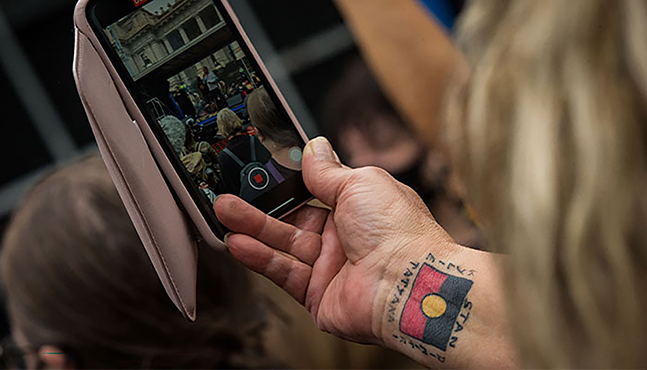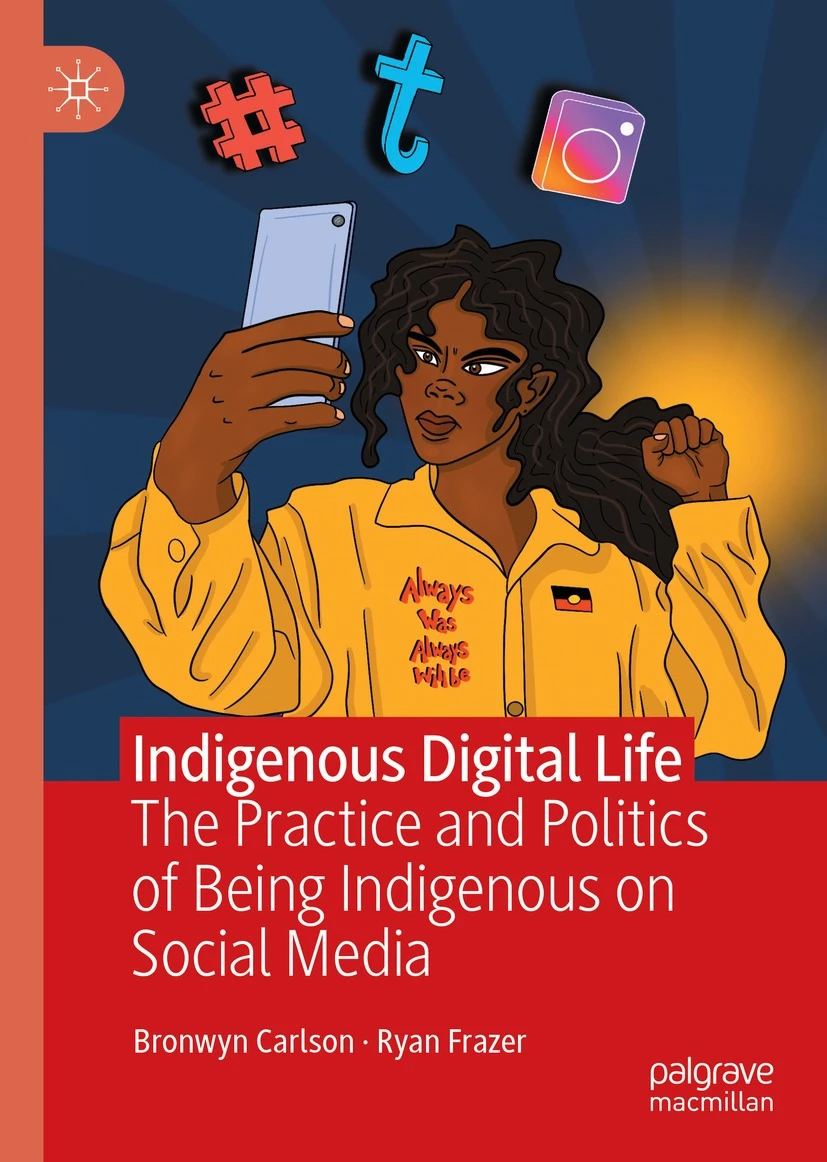A space of Indigenous action and creativity
Groundbreaking sociological research by Macquarie’s Department of Critical Indigenous Studies is documenting both the richness and challenges of Indigenous peoples’ participation in digital life.

The practice of being Indigenous online
Since the early days of Facebook, Professor Bronwyn Carlson has been overturning misconceptions about Indigenous peoples’ engagements with digital technologies.
Professor Carlson, Director of Macquarie’s Centre for Global Indigenous Futures, has employed a ‘bottom-up’ approach in her research. Her interviews with hundreds of Indigenous people across Australia has provided a window on the many ways that participants integrate social media into their everyday lives.
From X to Tik Tok to Tinder, interviewees have taken to online platforms to convey their Indigeneity, strengthen kinship connections, build communities, find partners, express creativity and humour, share cultural knowledge, mobilise for justice, seek and give care, and facilitate ‘Sorry Business’ and other cultural practices.
Exposing myths
These findings strongly refute the erroneous, yet pervasive, belief that Indigenous people are anti-technology. In their book Indigenous Digital Lives (2021), Professor Carlson and co-author Dr Ryan Frazer attribute this ‘myth’ to stereotypes of Indigenous people as ‘people of the past’.

Indigenous Digital Lives exposes this prejudice. Indigenous social media users are highly engaged online. What’s more, participants’ stories show that their online engagements often focus on the future – on taking up opportunities unlocked by social media to be creative and innovative, and use digital technologies to actively engage with the world.
A different experience
Indigenous people may use social media as much as anyone else. This does not mean that their online experiences are the same.
Macquarie’s researchers have shed light on both the opportunities digital technologies afford and the challenges Indigenous people face online.
Professor Carlson points out, for instance, that the importance of intergenerational kinship structures means that young Indigenous people are more likely to use Facebook than their non-Indigenous counterparts. Facebook allows younger Indigenous people to connect with and learn from older relatives from whom they might be separated by physical distance.
On the negative side, Indigenous people face high levels of online violence, including cyberbullying, hate speech and racism.
Hard to escape colonial violence
The growing volume of research about the prevalence and implications of technology-facilitated violence points to the seriousness of online violence as a public health concern.
But as Carlson and Frazer emphasise in a 2018 report prepared for the Aboriginal Health and Medical Research Council of NSW, most studies do not take cultural differences and political contexts into account. The assumption is that patterns and experiences of cyberbullying, for example, can be generalised across all populations.
In contrast, Carlson and Frazer show that acts of violence directed towards Indigenous people online are all too frequently entangled with the continuing effects of colonial violence. Indigenous people participating in digital spaces face disproportionately high rates of cyberbullying, hate speech and racism, often in the form of infantilising and criminalising racist stereotypes. On top of this, racist humour perpetuates these stereotypes while downplaying their harmfulness.
National benefit
Given their expertise and the relevance of their work, it is no surprise that Macquarie’s Critical Indigenous Studies researchers are often invited to partner with Indigenous organisations, government bodies, NGOs and industry. These partnerships embed Macquarie’s researchers at the forefront of national discussions and policymaking about digital safety.
Professor Carlson is a member of The National Mental Health Commission’s Expert Advisory Group on Digital Technologies and Youth Mental Health, as well as the Federal Government’s First Nations Digital Inclusion Advisory Council, and the Aboriginal and Torres Strait Islander Advisory Council to inform the next National Plan to end family, domestic and sexual violence.
Media Diversity Australia (MDA) commissioned Professor Carlson, Professor Sandy O’Sullivan, Madi Day and colleagues from Griffith University to author Australian-first research investigating the online abuse of diverse journalists and media workers. The Australian Broadcasting Corporation (ABC), Meta (Facebook), Google News Initiative, the e-Safety Commissioner and X all supported the project.
Released on May 3, 2023 to coincide with Press Freedom Day, the MDA report is a sobering read. The public nature of journalists’ work makes them especially vulnerable to online violence.
The researchers found that online harassment and abuse of diverse journalists has been normalised to the extent that 85% of their sample of Aboriginal and Torres Strait Islander, CALD (culturally and linguistically diverse), LGBTQIA+, and media workers with a disability had experienced either personal or professional abuse online. For almost 11% of respondents, this is a daily experience. 13% endure weekly aggression.
The MDA report makes 15 key recommendations about how employers, online platforms, regulators and policymakers can work with diverse journalists and media workers to improve their safety, wellbeing and, it is hoped, their longevity in the industry.
25b Wallys Walk
Macquarie University 2109